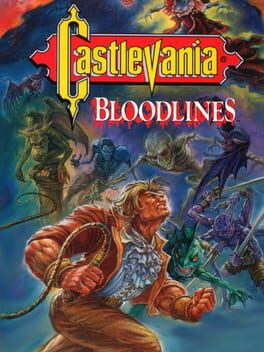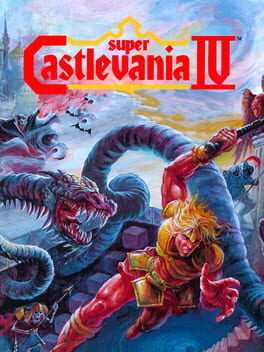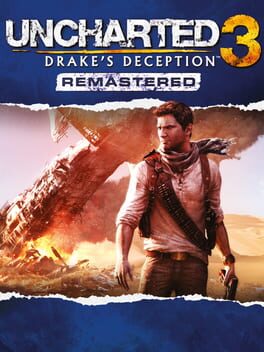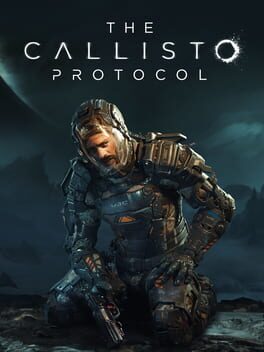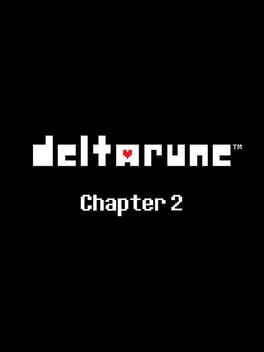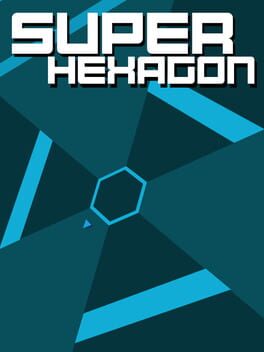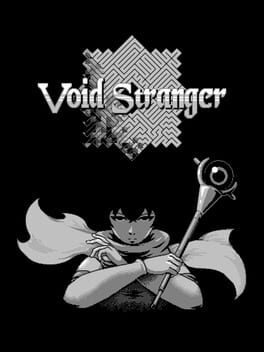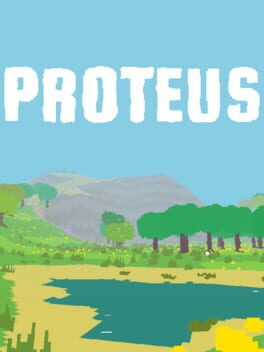1991
If you are coming from the NES games, this feels like a downgrade in every aspect except in the visuals. Levels go one after another, but the enemies and the jumps remain the same for long periods of time. Since you are larger now, one would think this would be more about whipping and dodging, but you would be wrong! This game feels like it doesn't know what it wants to do and it's very frustrating!
Anyway, almost everything can be saved because it still feels nice to move and the aesthetic can be jaw-droppingly gorgeous. But I would recommend playing it before any other game if you're new to the franchise.
Anyway, almost everything can be saved because it still feels nice to move and the aesthetic can be jaw-droppingly gorgeous. But I would recommend playing it before any other game if you're new to the franchise.
El juego más moralmente asqueroso que se ha hecho jamás. Trampa para incautos, adormecedor para perezosos, aturdidor para inquietos. Un dragón con piel de cordero que quiere hacernos creer que el videojuego nunca se bastará por sí solo.
----------
The most morally repugnant game ever made. A trap for the unwary, numbing for those who are lazy, stupefying for those who want to change things. A dragon disguised in a cute lamb's skin that wants to make us believe videogames will never be good enough.
----------
The most morally repugnant game ever made. A trap for the unwary, numbing for those who are lazy, stupefying for those who want to change things. A dragon disguised in a cute lamb's skin that wants to make us believe videogames will never be good enough.
2018
To me, this was the equivalent of Christopher Nolan's Batman trilogy, in that it tries so desperately to give nuance and perspective to a franchise and concepts that the designers are pretty obviously embarrassed about, but don't have the courage to confront head on. As a result, the game feels like a cowardly attempt to revise the franchise's reputation in what ultimately is a pretty bland effort to make a game about smashing and beheading into a Last of Us lookalike. To compound things, they added an upgrade system that is utterly uninspired, and a companion that barely does anything because God forbid we run the risk of making Kratos' son mechanically annoying.
Overall, an incredibly spineless work. The fact that it received nothing but accolades probably means it's going to get more and more tone-deaf from here, so get ready for another Tomb Raider trilogy situation!
Overall, an incredibly spineless work. The fact that it received nothing but accolades probably means it's going to get more and more tone-deaf from here, so get ready for another Tomb Raider trilogy situation!
El último título oficial de la saga de Nathan Drake y el último juego de Naughty Dog antes de que entrara en la Era de Druckman y se volviera aún más pretencioso, inseguro de sí mismo y explotador, es también el título de Uncharted que se me ha hecho menos cuesta arriba. Claro que eso tampoco quiere decir que tenga muchas cosas buenas que decir sobre él. Desde el principio ha sido obvio que los juegos de esta saga aspiraban a recrear, en clave estética que no jugable, los altos vuelos de una película de aventuras y la grandiosidad del cine épico de Hollywood. Por el camino, seguramente, se esperaba que esta aproximación artística también crearía la misma profundidad filosófica o espiritual que una obra como En Busca del Arca Perdida o La Última Cruzada lograron alcanzar. Pero como siempre, lo que esta manera de imitar de forma tan servil ha demostrado una y otra vez desde principios de siglo es que, si te posiciones desde el principio como une artista endeuade a las tradiciones de otros medios, los resultados nunca traerán nada mejor que En Busca del Templo Maldito o La Calavera de Cristal.
El equipo guionista hace esfuerzos titánicos para que la fórmula funcione, y tal vez por eso esta historia me resulte la menos cargante de las tres (aunque me descubro echando de menos la simpleza del primer Uncharted, mucho más cercano a los Tomb Raider que mira tan por encima del hombro). Pero por el camino, el diseño de niveles se ha rendido por completo al formato de pasillos emperifollados a los que la franquicia siempre iba apuntando desde el principio. La relativa variedad que ofrecen los encuentros-arena queda siempre subordinada a la secuencia de acción más óptima: destruye siempre a los tanques, luego a los francotiradores, luego a los tipos con armadura y si acaso ya te vas encargando del resto a tu ritmo. El modo sigilo que aportará tanto dinamismo a The Last of Us aún es un proyecto a medio hacer. Y las secuencias de salto, como viene siendo habitual, son poco más que un ejercicio de saber a dónde apunta la cámara y saltar hacia allí. Lo único que nos queda por juzgar (más allá del extremadamente simple sistema de combate cuerpo a cuerpo) son las largas secuencias andando en las que el juego nos invita a adoptar un ritmo más lento, o pensar la solución a un puzzle, o dejarnos llevarnos por la historia. Y como ya he dado a entender antes, el esfuerzo es admirable en más de un aspecto, pero el impacto de estos caminos de baldosas amarillas queda en entredicho cuando cualquier actuación de carne y hueso aporta más energía que estas agotadas voces de doblaje y estos risibles conjuntos de polígonos animados.
Escribiré sobre esto de forma más fría, pero creo que mi principal observación de estos juegos, por lo menos ahora, es que son extremadamente anti-jugadore. En ningún momento dejé de sentirme como si estuviera interfiriendo el drama de instituto de une profesore de teatro, y aunque participar está bien, siempre acabé con un agujero en el estómago y, por qué no admitirlo, con un poquito de rencor por no haberme dejado improvisar.
------------------------
The last title of the Nathan Drake trilogy, and the last Naughty Dog game before it entered the Druckman Era and became more pretentious, self-conscious and exploitative than ever, it's also the Uncharted title that I've found to be the least tedious to finish. Of course, that's doesn't mean I have many good things to say about it. It's been always obvious that these games have aspired from the beginning to reach the same highs, at least aesthetically, of adventure movies like Raiders of the Lost Ark and epic movies like Lawrence of Arabia. It does feel like they hoped that by copying the surface elements of these movies they would be able, somehow, to reach the philosophical or spiritual depth that a work like The Last Crusade managed to achieve. But as always, what this slavishly imitative approach has proven time and again since the turn of the century is that, if you deliberately put yourself below the artistic heights of other media, you'll be only be able to achieve medioucre results that won't be that much better from Temple of Doom or The Kingdom of the Crystal Skull.
The writers here have made a herculean effort trying to make this work, though, and perhaps that's why I find this game to have the least annoying story of them all- though more and more I'm finding myself longing for the simplicity and Tomb Raider-esque approach that the first Uncharted took, despite obviously trying to distance from them. But along the way, however, the level design of the game has completely surrendered to the stripped down corridors format that they seemingly wanted to fall into. The variety offered by arena encounters is always resolved through the same sequence: always begin with the tanks, then the snipers, then the armored guys, and eventually you'll take care of the rest. The stealth mode that will bring so much dynamism to The Last of Us is still half-baked here. And the jump sequences, as usual, are little more than an exercise in knowing where the camera is pointing at and jumping there. The only thing left for us to judge (beyond the extremely simple melee combat system) are the long walking sequences in which the game invites us to slower our pace, or solving a puzzle, or ponder about the story. And as I've implied before, the effort is admirable on its own, but the impact of these yellow-bricked roads is undermined when any flesh-and-blood performance brings more energy than these exhausted voice-overs and laughable polygons.
I'll write about this more coldly, but I think my main contention with these games now is that they are extremely anti-player. At no point did I ever stop feeling like I was inside a teacher's high school theater project, and while participating was fine, I ended up confused and a little bit upset that they didn't let me improvise a little along the performance.
El equipo guionista hace esfuerzos titánicos para que la fórmula funcione, y tal vez por eso esta historia me resulte la menos cargante de las tres (aunque me descubro echando de menos la simpleza del primer Uncharted, mucho más cercano a los Tomb Raider que mira tan por encima del hombro). Pero por el camino, el diseño de niveles se ha rendido por completo al formato de pasillos emperifollados a los que la franquicia siempre iba apuntando desde el principio. La relativa variedad que ofrecen los encuentros-arena queda siempre subordinada a la secuencia de acción más óptima: destruye siempre a los tanques, luego a los francotiradores, luego a los tipos con armadura y si acaso ya te vas encargando del resto a tu ritmo. El modo sigilo que aportará tanto dinamismo a The Last of Us aún es un proyecto a medio hacer. Y las secuencias de salto, como viene siendo habitual, son poco más que un ejercicio de saber a dónde apunta la cámara y saltar hacia allí. Lo único que nos queda por juzgar (más allá del extremadamente simple sistema de combate cuerpo a cuerpo) son las largas secuencias andando en las que el juego nos invita a adoptar un ritmo más lento, o pensar la solución a un puzzle, o dejarnos llevarnos por la historia. Y como ya he dado a entender antes, el esfuerzo es admirable en más de un aspecto, pero el impacto de estos caminos de baldosas amarillas queda en entredicho cuando cualquier actuación de carne y hueso aporta más energía que estas agotadas voces de doblaje y estos risibles conjuntos de polígonos animados.
Escribiré sobre esto de forma más fría, pero creo que mi principal observación de estos juegos, por lo menos ahora, es que son extremadamente anti-jugadore. En ningún momento dejé de sentirme como si estuviera interfiriendo el drama de instituto de une profesore de teatro, y aunque participar está bien, siempre acabé con un agujero en el estómago y, por qué no admitirlo, con un poquito de rencor por no haberme dejado improvisar.
------------------------
The last title of the Nathan Drake trilogy, and the last Naughty Dog game before it entered the Druckman Era and became more pretentious, self-conscious and exploitative than ever, it's also the Uncharted title that I've found to be the least tedious to finish. Of course, that's doesn't mean I have many good things to say about it. It's been always obvious that these games have aspired from the beginning to reach the same highs, at least aesthetically, of adventure movies like Raiders of the Lost Ark and epic movies like Lawrence of Arabia. It does feel like they hoped that by copying the surface elements of these movies they would be able, somehow, to reach the philosophical or spiritual depth that a work like The Last Crusade managed to achieve. But as always, what this slavishly imitative approach has proven time and again since the turn of the century is that, if you deliberately put yourself below the artistic heights of other media, you'll be only be able to achieve medioucre results that won't be that much better from Temple of Doom or The Kingdom of the Crystal Skull.
The writers here have made a herculean effort trying to make this work, though, and perhaps that's why I find this game to have the least annoying story of them all- though more and more I'm finding myself longing for the simplicity and Tomb Raider-esque approach that the first Uncharted took, despite obviously trying to distance from them. But along the way, however, the level design of the game has completely surrendered to the stripped down corridors format that they seemingly wanted to fall into. The variety offered by arena encounters is always resolved through the same sequence: always begin with the tanks, then the snipers, then the armored guys, and eventually you'll take care of the rest. The stealth mode that will bring so much dynamism to The Last of Us is still half-baked here. And the jump sequences, as usual, are little more than an exercise in knowing where the camera is pointing at and jumping there. The only thing left for us to judge (beyond the extremely simple melee combat system) are the long walking sequences in which the game invites us to slower our pace, or solving a puzzle, or ponder about the story. And as I've implied before, the effort is admirable on its own, but the impact of these yellow-bricked roads is undermined when any flesh-and-blood performance brings more energy than these exhausted voice-overs and laughable polygons.
I'll write about this more coldly, but I think my main contention with these games now is that they are extremely anti-player. At no point did I ever stop feeling like I was inside a teacher's high school theater project, and while participating was fine, I ended up confused and a little bit upset that they didn't let me improvise a little along the performance.
Qué inmenso desperdicio. Un sistema de combate mal concebido aplicado a un sistema de niveles insípido, secuencias de sigilo completamente superfluas y una historia y caracterización que parece abrazar más que nunca la idea de "Resident Evil in Space" de la que Dead Space nunca se terminó de librar. Jugar a esto me ha hecho replantearme seriamente si la trilogía original de Schofield fue tan buena como recordaba, o si me dejé llevar por los pitos y flautas del momento. Es aún peor jugar a esto en la versión localizada, porque tienes a actores de calidad doblando escenas que claramente no tenían permitido ver, con lo que el tono se pierde completamente.
En un mundo ideal, esto habría sido el equivalente a Condemned que Monolith diseñó tras el éxito de F.E.A.R. Tal y como se ve ahora, es poco más que una demo técnica vistosa, pero apenas estable, de un ejercicio de soberbia artística.
----------------------
What a waste. A poorly conceived combat system applied to bland level design, completely superfluous stealth sequences, and a story and characters that seems to embrace more than ever the "Resident Evil in Space" premise that Dead Space never quite got rid of. Playing this has made me seriously rethink whether Schofield's original trilogy was as good as I remembered, or if I got carried away by the whistles. It's even worse to play this localized, because you'll have quality actors dubbing scenes they clearly weren't allowed to see, so the tone gets completely lost.
In an ideal world, this would have been the Condemned equivalent that Monolith delivered after the success of F.E.A.R. As it stands now, it's little more than a flashy but barely stable technical demo of an act of artistic hubris.
En un mundo ideal, esto habría sido el equivalente a Condemned que Monolith diseñó tras el éxito de F.E.A.R. Tal y como se ve ahora, es poco más que una demo técnica vistosa, pero apenas estable, de un ejercicio de soberbia artística.
----------------------
What a waste. A poorly conceived combat system applied to bland level design, completely superfluous stealth sequences, and a story and characters that seems to embrace more than ever the "Resident Evil in Space" premise that Dead Space never quite got rid of. Playing this has made me seriously rethink whether Schofield's original trilogy was as good as I remembered, or if I got carried away by the whistles. It's even worse to play this localized, because you'll have quality actors dubbing scenes they clearly weren't allowed to see, so the tone gets completely lost.
In an ideal world, this would have been the Condemned equivalent that Monolith delivered after the success of F.E.A.R. As it stands now, it's little more than a flashy but barely stable technical demo of an act of artistic hubris.
2021
This review contains spoilers
I am going to try to collect my thought in some form of essay, but for the time being, I think Deltarune suffers because it tries to operate on three very different layers at the same time: one comes from the mechanics, another from the narrative and the last one from the metanarrative of it all.
The first layer tries to deepen the critique that Undertale already exposed by suggesting a combat system in which you wouldn't need to use the Fight command anywhere by making the Action as diverse and varied as possible. This means that, for all purposes, Actions now are akin to the decisions you make in a visual novel or a graphic adventure, which is fine, but makes framing these encounters as "fights" weirder and weirder. If we take into account that some of the Actions are understood by the narrative as acts of violence as well, then what purpose does setting this distinction make anymore? And considering that now there's a collectable element to sparing enemies, that makes the whole affair just another mechanical chore that hast lost all the bite it purported to have.
The second layer is probably the strongest, because it tries to convey an emotional truth through dialogue and characters that feel as charming and relatable as they were in Undertale. I said this before, but if I keep playing these titles is for the characters. But that poses an important problem, which is that basically I'm not allowed to know about some of these characters' more interesting traits if it's not by straining them out of the "good" path, which is still as rigid as before. Instead of creating a tantalizing moment in which I'm wondering whether to explore some part of Noelle's past or the other, I have to choose between a pre set "pacifist" route that morally obligues me to not knowing these characters unless I deliberately bring harm unto them.
Which brings us to the third and last layer, the metanarrative. Just like with Undertale, Deltarune tries to make a point about choosing to be a bad person in video games and suffering the consequences, and unlike the first chapter, it reaffirms the consequences of my actions and encourages me to suck them up. But I mus ask, what is the point of it now? Do I really need to be taught that there are better ways to play? In that case, why develop a whole system around a specific ability (the Ice Magic of Noelle) and its outcome? Just for the sake of it? Isn't that diametrically opposed to what the game purports to be about?
I think Deltarune is confused about which route to take, and in trying to do everything at the same time, suffers for it. I know why I'm playing it, but I'm bothered that it thinks that I'm doing it for the wrong reasons.
The first layer tries to deepen the critique that Undertale already exposed by suggesting a combat system in which you wouldn't need to use the Fight command anywhere by making the Action as diverse and varied as possible. This means that, for all purposes, Actions now are akin to the decisions you make in a visual novel or a graphic adventure, which is fine, but makes framing these encounters as "fights" weirder and weirder. If we take into account that some of the Actions are understood by the narrative as acts of violence as well, then what purpose does setting this distinction make anymore? And considering that now there's a collectable element to sparing enemies, that makes the whole affair just another mechanical chore that hast lost all the bite it purported to have.
The second layer is probably the strongest, because it tries to convey an emotional truth through dialogue and characters that feel as charming and relatable as they were in Undertale. I said this before, but if I keep playing these titles is for the characters. But that poses an important problem, which is that basically I'm not allowed to know about some of these characters' more interesting traits if it's not by straining them out of the "good" path, which is still as rigid as before. Instead of creating a tantalizing moment in which I'm wondering whether to explore some part of Noelle's past or the other, I have to choose between a pre set "pacifist" route that morally obligues me to not knowing these characters unless I deliberately bring harm unto them.
Which brings us to the third and last layer, the metanarrative. Just like with Undertale, Deltarune tries to make a point about choosing to be a bad person in video games and suffering the consequences, and unlike the first chapter, it reaffirms the consequences of my actions and encourages me to suck them up. But I mus ask, what is the point of it now? Do I really need to be taught that there are better ways to play? In that case, why develop a whole system around a specific ability (the Ice Magic of Noelle) and its outcome? Just for the sake of it? Isn't that diametrically opposed to what the game purports to be about?
I think Deltarune is confused about which route to take, and in trying to do everything at the same time, suffers for it. I know why I'm playing it, but I'm bothered that it thinks that I'm doing it for the wrong reasons.
2012
2023
Necesitaría mucho más que unas pocas líneas para intentar describir los altibajos emocionales que Void Stranger me ha provocado. Incomprensión e incomodidad, interés y fascinación, rabia y melancolía, alegría y asombro, y finalmente, un tono agridulce al que me alegro de haber jugado. Por cada piso que pude terminar por mi cuenta, hubo tres que tuve que buscar la solución online; por cada mural que descifré, dos que no hubiera entendido jamás; y por cada escena de culpa católica enmarcada en personajes estereotípicos que me hizo apretar los dientes de la indignación, hubo tres que me hicieron sentir que estaba tocando de verdad al autore.
Decimos que los juegos son obras personales de la misma forma que decimos que detrás de cada obra de arte se sobreentiende siempre cierto esfuerzo y horas de trabajo: como una convención comodona, destinada a reafirmar nuestra decisión de dedicar el poco tiempo que tenemos de vida a un arte que seguramente no posea ni la mitad de humanidad que el poema más parco. Con Void Stranger sentí que experimentaba arte y basura a partes iguales, y en ese sentido, es un juego que me ha hecho pensar más que nunca en mi relación con este medio que me ha traído tantas alegrías y tantas, tantas decepciones.
Puedes admirar Void Stranger por la inquina mentalidad puesta a la hora de diseñar según que puzzles, y puedes detestarlo por su tendencia casi obsesiva a la ofuscación, que en más de una ocasión me hicieron querer cortar del todo. También puedes reconocer su intrincada narración, digna de cierta escuela de diseño post-Undertale que pareció tomar como única lección el accidente de Gaster. Pero para mí, lo que tiene valor de esta maraña de modos extra es el hecho de que, al final del día, el mensaje siempre es el mismo, el de la importancia de aprender a amar. En los momentos en que es así de simple, Void Stranger me agarra de verdad, y en los momentos en que deja relucir sus partes más avergonzadas, es cuando me irrita de verdad.
Así que le pongo un 4, porque supongo que un 5 quedaría reservado para los juegos que me afectan a un nivel estrictamente personal o me parecen encapsulaciones ideales de una forma que no siempre sabré explicar, puedo afirmar sin ninguna duda que hay muchas cosas en Void Stranger que no me gustan. Pero no puedo negar que me ha hecho pensar de un modo que pocas obras, irónicamente desde Undertale, lograron.
--------------------------
I would need much more than a few lines to describe the emotional ups and downs that Void Stranger has provoked in me. Incomprehension and discomfort, interest and fascination, anger and melancholy, joy and wonder, and finally, a bittersweet note that I'm glad I had the opportunity to experience. For every floor I was able to finish on my own, there were three I had to look up the solution online for; for every mural I deciphered, two of them I would never have guessed on my own; and for every scene of Catholic guilt framed by stereotypical characters that made me cringe in indignation, there were three that made me feel like I was really reaching the author.
We say that games are personal works in the same way that there's always some effort put behind everything, in the sense that we use to reaffirm our life choice to devote so much of our precious time on Earth to an art form that probably doesn't have as much humanity within it as the shortest poem. With Void Stranger I felt like I was experiencing art and dreck on several occasions, and in that sense, it is a game that has made me think more about my relationship with a medium that has brought me so much joy and yet so much disappointment than many others.
You can admire Void Stranger for its devilish attitude towards puzzle design, and you can loathe it for its almost obsessive tendency to obfuscation, which made me want to quit it many times. You can also recognize its intricate storytelling, worthy of a post-Undertale school of design that took Gaster's accidental fame as its main bullet point. But for me, what's valuable about this mess of a title is the fact that, at the end of the day, the message remains the same: That of the importance of being loved. When it's that simple, is when it grabs me better. And when it's much more dishonest and shameful is when it really irritates me.
So I give it a 4, because I suppose a 5 should be reserved for games that affect me on a very personal level or encapsulate an ideal form of gaming that I'm not always good at explaining. I can state without a doubt that there are many things in Void Stranger that I don't like. But I can't deny that it has made me think in a way that few works, ironically since Undertale, managed to do.
Decimos que los juegos son obras personales de la misma forma que decimos que detrás de cada obra de arte se sobreentiende siempre cierto esfuerzo y horas de trabajo: como una convención comodona, destinada a reafirmar nuestra decisión de dedicar el poco tiempo que tenemos de vida a un arte que seguramente no posea ni la mitad de humanidad que el poema más parco. Con Void Stranger sentí que experimentaba arte y basura a partes iguales, y en ese sentido, es un juego que me ha hecho pensar más que nunca en mi relación con este medio que me ha traído tantas alegrías y tantas, tantas decepciones.
Puedes admirar Void Stranger por la inquina mentalidad puesta a la hora de diseñar según que puzzles, y puedes detestarlo por su tendencia casi obsesiva a la ofuscación, que en más de una ocasión me hicieron querer cortar del todo. También puedes reconocer su intrincada narración, digna de cierta escuela de diseño post-Undertale que pareció tomar como única lección el accidente de Gaster. Pero para mí, lo que tiene valor de esta maraña de modos extra es el hecho de que, al final del día, el mensaje siempre es el mismo, el de la importancia de aprender a amar. En los momentos en que es así de simple, Void Stranger me agarra de verdad, y en los momentos en que deja relucir sus partes más avergonzadas, es cuando me irrita de verdad.
Así que le pongo un 4, porque supongo que un 5 quedaría reservado para los juegos que me afectan a un nivel estrictamente personal o me parecen encapsulaciones ideales de una forma que no siempre sabré explicar, puedo afirmar sin ninguna duda que hay muchas cosas en Void Stranger que no me gustan. Pero no puedo negar que me ha hecho pensar de un modo que pocas obras, irónicamente desde Undertale, lograron.
--------------------------
I would need much more than a few lines to describe the emotional ups and downs that Void Stranger has provoked in me. Incomprehension and discomfort, interest and fascination, anger and melancholy, joy and wonder, and finally, a bittersweet note that I'm glad I had the opportunity to experience. For every floor I was able to finish on my own, there were three I had to look up the solution online for; for every mural I deciphered, two of them I would never have guessed on my own; and for every scene of Catholic guilt framed by stereotypical characters that made me cringe in indignation, there were three that made me feel like I was really reaching the author.
We say that games are personal works in the same way that there's always some effort put behind everything, in the sense that we use to reaffirm our life choice to devote so much of our precious time on Earth to an art form that probably doesn't have as much humanity within it as the shortest poem. With Void Stranger I felt like I was experiencing art and dreck on several occasions, and in that sense, it is a game that has made me think more about my relationship with a medium that has brought me so much joy and yet so much disappointment than many others.
You can admire Void Stranger for its devilish attitude towards puzzle design, and you can loathe it for its almost obsessive tendency to obfuscation, which made me want to quit it many times. You can also recognize its intricate storytelling, worthy of a post-Undertale school of design that took Gaster's accidental fame as its main bullet point. But for me, what's valuable about this mess of a title is the fact that, at the end of the day, the message remains the same: That of the importance of being loved. When it's that simple, is when it grabs me better. And when it's much more dishonest and shameful is when it really irritates me.
So I give it a 4, because I suppose a 5 should be reserved for games that affect me on a very personal level or encapsulate an ideal form of gaming that I'm not always good at explaining. I can state without a doubt that there are many things in Void Stranger that I don't like. But I can't deny that it has made me think in a way that few works, ironically since Undertale, managed to do.
2013
Estoy bastante seguro de que este juego va a seguir dando que hablar en el futuro, porque aunque pertenece a una época y escena artística concretas, ha sido el que más ha logrado atravesarlas con diferencia. Presentándose como poco más que una experiencia sensorial, esta obra es la culminación de multitud de trayectorias que algunos de los mejores artistas del medio venían experimentando desde mediados de los 2000. La reacción virulenta de artistas consagrados como Yahtzee Croshaw no hacen sino confirmar hasta qué punto este juego estuvo adelantado a su tiempo. Con nada más que la contemplación como tu único punto de agarre, este juego te obliga a hacer algo tan sencillo como dejarte llevar por los sonidos y los colores, y en un mundo tan agitado y convulso como el nuestro, eso se siente más revolucionario que cincuenta Braids de simbología pretenciosa.
------------------------------------------------------
I'm pretty sure that this game will still be talked about in the future because, despite belonging to a specific era and a certain art scene, it has been one of the only ones to surpass them. Presenting itself as little more than a sensory experience, this is the culmination of a multitude of trajectories that some of the best artists in the medium had been tweaking with since the mid-2000s. The vicious revolt against that established critics, such as Yahtzee Croshaw. had over it only confirms the extent of its success. With nothing but contemplation as your only tool, this game forces you to do something as simple as let yourself be carried away by sounds and colors, and in a world as hectic and convulsive as this, that feels more revolutionary than fifty Braids loaded with pretentious symbology.
------------------------------------------------------
I'm pretty sure that this game will still be talked about in the future because, despite belonging to a specific era and a certain art scene, it has been one of the only ones to surpass them. Presenting itself as little more than a sensory experience, this is the culmination of a multitude of trajectories that some of the best artists in the medium had been tweaking with since the mid-2000s. The vicious revolt against that established critics, such as Yahtzee Croshaw. had over it only confirms the extent of its success. With nothing but contemplation as your only tool, this game forces you to do something as simple as let yourself be carried away by sounds and colors, and in a world as hectic and convulsive as this, that feels more revolutionary than fifty Braids loaded with pretentious symbology.
